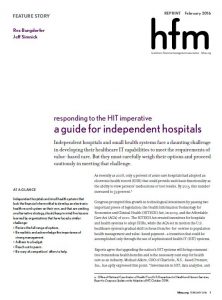Responding to the HIT Imperative: A Guide for Independent Hospitals
 Independent hospitals and small health systems face a daunting challenge in developing their healthcare IT capabilities to meet the requirements of value-based care. But they must carefully weigh their options and proceed cautiously in meeting that challenge.
Independent hospitals and small health systems face a daunting challenge in developing their healthcare IT capabilities to meet the requirements of value-based care. But they must carefully weigh their options and proceed cautiously in meeting that challenge.
Health systems that lack the financial wherewithal to develop an electronic health record system on their own, and that are seeking an alternative strategy, should keep in mind five lessons learned by organizations that have faced a similar challenge:
- Review the full range of options.
- Be realistic; Acknowledge the importance of strong management.
- Adhere to a budget.
- Reach out to peers.
- Be wary of competitors’ offers to help.
As recently as 2008, only 9 percent of acute care hospitals had adopted an electronic health record (EHR) that could provide such basic functionality as the ability to view patients’ medications or test results. By 2013, this number increased to 59 percent.
Congress prompted this growth in technological investment by passing two important pieces of legislation: the Health Information Technology for Economics and Clinical Health (HITECH) Act, in 2009, and the Affordable Care Act (ACA) of 2010. The HITECH Act created incentives for hospitals and health systems to adopt EHRs, while the ACA set in motion the U.S. healthcare system’s gradual shift in focus from fee-for-service to population health management and value-based payment—a transition that could be accomplished only through the use of sophisticated health IT (HIT) systems.